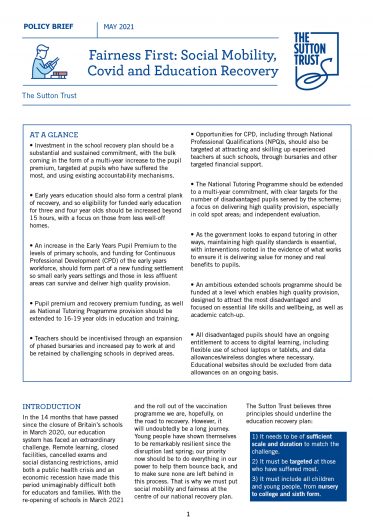• Investment in the school recovery plan should be a substantial and sustained commitment, with the bulk coming in the form of a multi-year increase to the pupil premium, targeted at pupils who have suffered the most, and using existing accountability mechanisms.
• Early years education should also form a central plank of recovery, and so eligibility for funded early education for three and four year olds should be increased beyond 15 hours, with a focus on those from less well-off homes.
• An increase in the Early Years Pupil Premium to the levels of primary schools, and funding for Continuous Professional Development (CPD) of the early years workforce, should form part of a new funding settlement so small early years settings and those in less affluent areas can survive and deliver high quality provision.
• Pupil premium and recovery premium funding, as well as National Tutoring Programme provision should be extended to 16-19 year olds in education and training.
• Teachers should be incentivised through an expansion of phased bursaries and increased pay to work at and be retained by challenging schools in deprived areas.
• Opportunities for CPD, including through National Professional Qualifications (NPQs), should also be targeted at attracting and skilling up experienced teachers at such schools, through bursaries and other targeted financial support.
• The National Tutoring Programme should be extended to a multi-year commitment, with clear targets for the number of disadvantaged pupils served by the scheme; a focus on delivering high quality provision, especially in cold spot areas; and independent evaluation.
• As the government looks to expand tutoring in other ways, maintaining high quality standards is essential, with interventions rooted in the evidence of what works to ensure it is delivering value for money and real benefits to pupils.
• An ambitious extended schools programme should be funded at a level which enables high quality provision, designed to attract the most disadvantaged and focused on essential life skills and wellbeing, as well as academic catch-up.
• All disadvantaged pupils should have an ongoing entitlement to access to digital learning, including flexible use of school laptops or tablets, and data allowances/wireless dongles where necessary. Educational websites should be excluded from data allowances on an ongoing basis.
